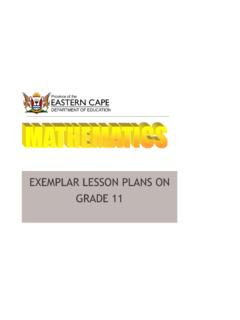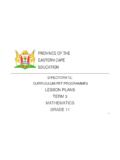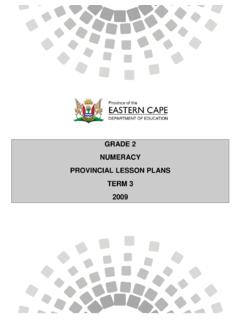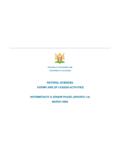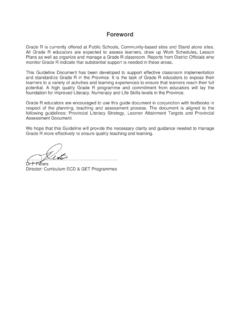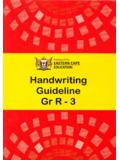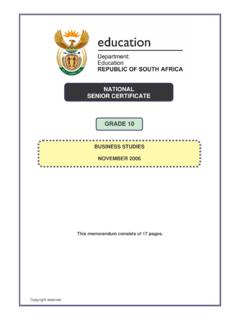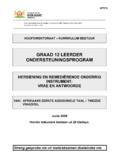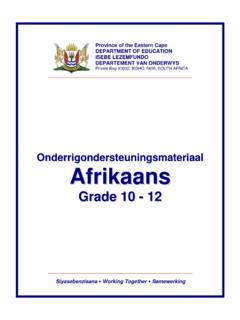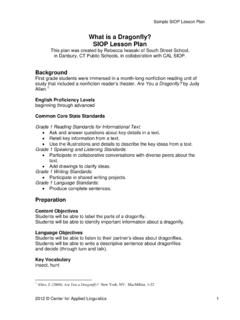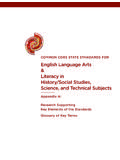Transcription of ENGLISH HOME LANGUAGE LESSON PLAN …
1 ENGLISH HOME LANGUAGELESSON plan EXEMPLARSGRADE 3 TERM 42009 2 Province of the DEPARTMENT OF EDUCATION EASTERN CAPE CURRICULUM SECTION NOTE TO SCHOOL MANAGEMENT TEAMS AND TEACHERS IN THE FOUNDATION PHASE The exemplar Literacy LESSON Plans for Grade 1 teachers had been developed by the Provincial and District Foundation Phase Curriculum Advisors and Foundation Phase teachers as well. This is intended to support teachers in the Planning, Teaching and Assessment process for Term 4. The contents include the 3 Learning Programmes (Literacy, Life Skills and Numeracy) in an integrated, flexible and very user friendly manner. The LESSON plans provide specific content and context which should guide the teacher in the planning process. We trust that these support materials will provide the necessary clarity and guidance for teachers to manage the NCS implementation process successfully and confidently.
2 It is the responsibility of the School Management Team to monitor and support teachers in the use of these resources. The teachers are responsible for using these resources to manage the Planning, Teaching and Assessment process successfully in the classroom. These are exemplars that are aligned to National Policies and prescripts and teachers are encouraged to use and adapt these lessons to suit the needs and context of the learners and the school. If schools need more clarity and guidance on the use of these Resource Materials the District and Provincial Offices can be contacted. We trust that every school will now be better equipped to improve learner performance in the Foundation Phase. Yours in Quality Education ------------------------------------- Dr T Reddy CES: ECD/Foundation Phase: Head Office: Zwelitsha 3 INTRODUCTION The Eastern Cape Department of Education, Curriculum Chief Directorate in collaboration with the District Curriculum Advisors developed this document to support teachers in planning for teaching, learning and assessment for effective implementation of the National Curriculum Statement (NCS) and the Foundations for Learning (FFL) in the Foundation Phase The Home Languages, Afrikaans, ENGLISH , IsiXhosa and SeSotho deal with the holistic development of the child, socially, emotionally, personally and physically.
3 LANGUAGE is of utmost importance in learners lives. It is the means of communication and conversation. No Learning Area (LA) can be taught without the use of LANGUAGE . So it is necessary for learners to master all aspects of LANGUAGE usage. This includes the ability to talk clearly, fluently and to express themselves without ambiguities; to listen with ease and understanding and to express clearly their thoughts orally and in writing. It also includes the ability to the Listening, Speaking, Reading and Writing in order to enrich their own lives and the lives of others. This document serves to assist teachers to pace teaching, learning and assessment in Afrikaans, ENGLISH , IsiXhosa and SeSotho Home Languages for Grades 1- 3, starting from Grade R in IsiXhosa and ENGLISH First Additional LANGUAGE (FAL) for Grade 3. A Work Schedule for term 4 has been developed in Learner Attainment Targets (LAT) documents.
4 Integration of Assessment Standards has been done for the teachers. Planning accommodates Formal Assessment Tasks (FATs) and Learner Attainment Targets (LAT) as indicated in the Afrikaans, ENGLISH , IsiXhosa, SeSotho Home Languages and First Additional LANGUAGE (FAL) LAT documents available in all the Foundation Phase schools. LESSON plan exemplars can be adapted and refined so that they meet the needs and the context of the learner. The resources that are indicated are a guide. Teachers are at liberty to use other relevant material. The contact time for Literacy Learning Programme is 1 hour 50 minutes daily for Grade 1(10mins for FAL),1hr 50mins for Grade 2 (20 mins for FAL) 2hours for Grade 3 (30 mins for FAL). 5 hours 15 minutes weekly for the learners and 7 hours weekly for the teachers (1 hr 45 mins for preparations) according to FFL. All the aspects of Literacy have separate time on daily basis, for example Drop All and Read for 30 minutes.
5 This time allocation for Literacy must be adhered to. 4 LESSON plan LEARNING PROGRAMME: LITERACY (HL) GRADE: 3 CONTENT IN CONTEXT: OUR COUNTRY SOUTH AFRICA DURATION: 3 Weeks Selected LO s and AS s Learning Activities Resources LO 1: LISTENING AS 1: Listens attentively and responds to an extended sequence of instruction to the learners level AS 2: Demonstrates appropriate listening behaviour showing respect to the speaker, taking turns to speak, asking questions for clarification and summarising commenting on what has been heard. AS 4: Listens with enjoyment to stories, poems, songs and other oral texts and shows understanding Listens for the topic or main idea AS Listens for detail Predicts what will happen AS Communicates back a sequence of events or ideas DEMOCRACY AND OUR LEADERS Class I won t be here for the following two days.
6 Not all of you can go to the other class, there is not enough space for everybody. The classes are so small and there are so many learners. Ms Madisane will give you work to do. She won t be able to be in your classroom the whole time, she has her own class. A class election Therefore I want you to elect a class leader that will make sure that everything will be fine. You must think carefully who you want to elect. That leader will again choose a few learners to assist him/her. You are going to elect the leader yourselves, so then you must listen to the leader while I m away. During break time learners are discussing the possible Story books Reference books Information pamphlets Readers Phonic cards 5 AS Answers questions about oral text AS Expresses feelings about the text, giving reasons AS Works out cause and effect in the oral texts As Draws pictures to illustrate understanding of the oral text, and writes it in own words.
7 AS 6 Listens to a speaker the learner cannot see (e. g. on the radio or over the intercom) and responds to questions and instructions. LO 2: SPEAKING: AS 1: Recounts personal experiences, and more general news events, and expresses feelings and opinions about it AS 2: Use languages imaginatively for fun and fantasy (eg. Telling jokes, creating own poems and code LANGUAGE ) AS 5: Contributes to group and class discussions AS Initiates topics in group discussion AS Take turns and ask relevant questions AS Shows sensitivity to the rights and feelings of others candidates. I think we must vote for Nabeel. I also like Nabeel, but I think Sindiswa is a better choice. She is clever and will be able to help us. Oh no! I don t like her at all. What about Chris? Chris is too naughty, we will all be in trouble. Sifiso goes to the girls and try to convince them to vote for him.
8 If you vote for me, I shall tell you stories everyday. This is true. Sifiso can tell beautiful stories. We can t listen to Sifiso s stories the whole day; Ms said that we must work. Mariaan said if we vote for her, she will bring a packet of sweets for everyone everyday to school. Yes! Yes! I love sweets. This is nonsense, how will Mariaan be able to buy all those sweets? The next day after break time the learners have to vote. Everybody receives a piece of paper and the learners have to write down the name of the learner he/she wants to be the class leader. Ms writes the names of those that appear on the pieces Flash cards Magazines Newspapers 6 AS Summarises the group s work As asks questions for clarity and information AS answers questions and gives reasons for answers AS gives constructive feedback to others AS 8: Engages in conversation as a social skill LO 3: READING AND VIEWING AS 2 Makes meaning of written text AS Comments on a story or poem the learner has read and demonstrates understanding by answering questions: AS Main idea key details such as main characters, sequence of events, setting cultural values AS Cause and effect relations As Conclusions (eg.)
9 What does the story/fable teach us) AS Reads instructions to related to real life interests and needs AS Reads a variety of fairly complex text, such as of paper on the chalkboard. Ms counts the votes and Sifiso has the most votes. He elects Sindiswas and Thonga to help him. The next day the learners are alone, things are not going well. Thonga is fighting with all the boys. They can t do anything because he is the leader. Why did we ever vote for Sifiso, because Thonga is his best friend ands he is a real bully! Class discussion: Every school have leaders or prefects. Why? What role must they play? Who elects them? How are they been elected? Why are they elected and not others? How are the Head boy and Head girl elected? What are the characteristics or a leader? What happens if they are not good leaders? Do a flow diagram together with these questions as captions.
10 Every country needs leaders. Use the previous flow diagram to illustrate how the leaders of our country are being elected. Discuss the following concepts: 7 fiction and non-fiction books, tables of content and indexes AS 3 Reads texts alone, and uses a variety of strategies to make meaning: AS Reads a printed text fluently and with understanding AS Pronounces words with accuracy when reading aloud AS Reads aloud with expression, using appropriate stress, pausing and intonation AS Uses word recognition and comprehension skills to read unfamiliar text ( Phonics, contextual cues, predicting) AS Uses a range of automatic monitoring and self-correcting methods when reading such as re-reading, reading on, pausing, and practising the word before saying it aloud AS 5 Reads for information and enjoyment: As chooses fiction and non-fiction books and says what was liked and not liked about them; AS reads different kinds of texts (e.)
